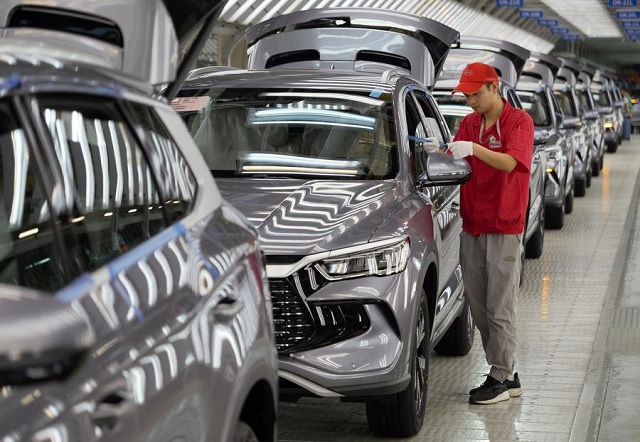
When China is making the world cleaner by providing quality electric vehicles (EVs) to global consumers, what has the United States been doing other than pointing the finger at China?
Beijing, China | Yi Xin | In her recent trip to China, U.S. Treasury Secretary Janet Yellen repeatedly blasted Beijing’s industrial “overcapacity” for threatening the global economy.
But her accusation deliberately ignored the most basic laws of market economy: On the supply side, it is innovation, cost-efficient manufacturing and quality products that make China’s clean sector stand out, not government subsidies; On the demand side, these clean products are urgently needed in great amount, not just by developing countries but also by advanced economies like the United States to reorient their economies toward greener growth.
When China is making the world cleaner by providing quality electric vehicles (EVs) to global consumers, what has the United States been doing other than pointing the finger at China? Unfortunately, it is creating many dark clouds that are looming over workers and businesses in its own country and around the world.
RISING TRADE PROTECTIONISM AND NON-MARKET PRACTICES
Americans used to pride themselves on open market and free trade, and many still do today. But now it seems that U.S. policymakers are increasingly deviating from the path, partly fueled by the resurgence of populism at home.
From the “America First” policy to the “Buy America” agenda, the country does not even bother to obfuscate its shift toward protectionism. Under the CHIPS and Science Act and the Inflation Reduction Act, the Biden administration has earmarked about 30 billion U.S. dollars in subsidies for advanced semiconductor manufacturing, with the aim of moving cutting-edge chip R&D and manufacturing to America.
In so doing, the United States has hurt the interests of not only its imagined adversary but also its allies. One stinging comment comes from Hankyoreh newspaper of South Korea: “The U.S. is morphing from a guardian of free trade into a disrupter of international trade norms.”
For the rest of the world, when they see the United States stepping away from its leadership of a functional multilateral trading system, they might lose confidence and turn more inward-looking as well, which could eventually cause the entire system to crumble.
UNFAIR COMPETITION
The United States likes to describe its relations with China as “competitive when it should be.” But when it really comes to areas with intense competition, America’s tactics are not aimed at making itself better, but rather to take down the other.
From the arbitrary restrictions on Huawei, to the attempt of putting a stranglehold on TikTok, the United States is proving with concrete steps that it is no longer interested in fair competition. How is Huawei a national security risk when it openly announced its readiness to sign a “no-backdoor” agreement with any country? And how is TikTok a national security risk when U.S. President Joe Biden himself happily made his TikTok debut earlier this year?
This farce only shows the world more clearly how far the United States is willing to go to protect its interests with the self-invented “rules” and “order.” It looks like its policy should be rephrased into “double standards when it should be.”
A CLOSED-DOOR POLICY
As the “city upon a hill,” America used to welcome immigrants from all over the world with open arms. But for Chinese scientists and scholars, this has clearly not been the case in recent years.
According to available data, nearly 300 Chinese nationals, including more than 70 students with valid travel documents, have been harassed, interrogated and deported by the U.S. law enforcement for no apparent reason since July 2021.
Some Americans might be smug about their dirty game, but in the long run, it drives away not only some of the best and brightest minds from China but also many from third countries who worry that one day they would end up in the same place if they do things the United States does not like. As fewer people go to America, the investments, innovation, ideas and everything else that comes along will gradually diminish, eventually hurting the country itself.
SURGING DEBT CRISIS
In recent years, the U.S. reliance on quantitative easing and other unconventional monetary policies has flooded the global markets with liquidity and increased the risks of asset bubbles.
And with mounting domestic inflationary pressure, the Federal Reserve had to raise interest rates, triggering outflows of capital and exchange rate fluctuations in emerging markets.
Given the role of the dollar as the world’s leading reserve currency, this could lead to serious spillovers for other countries. With the total debt of the U.S. federal government exceeding 34 trillion dollars, a profound debt crisis is like a ticking bomb facing the world economy and financial system.
Biden once said, “It’s never been a good bet to bet against America.” Funny enough, given the many misguided policies, it is the United States that is betting against itself, not anyone else.
So instead of shifting the blame onto China, the United States should really think about redirecting its focus to its own problems and make proper adjustments to its economic and foreign policies.
******
Editor’s note: Yi Xin is a Beijing-based observer of international affairs.
The views expressed in this article are those of the author’s and do not necessarily reflect those of Xinhua News Agency.■
 The Independent Uganda: You get the Truth we Pay the Price
The Independent Uganda: You get the Truth we Pay the Price



